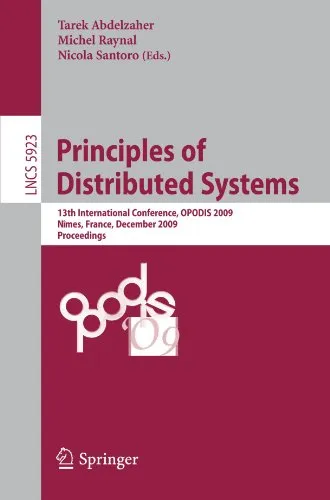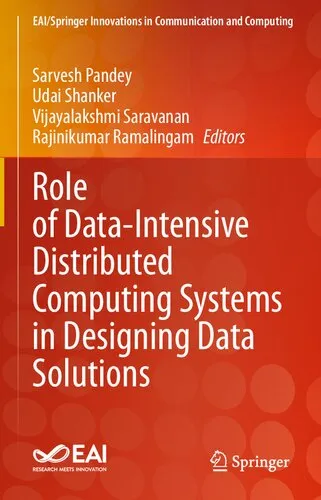Principles of Distributed Systems: 13th International Conference, OPODIS 2009, Nîmes, France, December 15-18, 2009. Proceedings
4.0
بر اساس نظر کاربران

شما میتونید سوالاتتون در باره کتاب رو از هوش مصنوعیش بعد از ورود بپرسید
هر دانلود یا پرسش از هوش مصنوعی 2 امتیاز لازم دارد، برای بدست آوردن امتیاز رایگان، به صفحه ی راهنمای امتیازات سر بزنید و یک سری کار ارزشمند انجام بدینکتاب های مرتبط:
مقدمهای به کتاب "Principles of Distributed Systems: 13th International Conference, OPODIS 2009, Nîmes, France, December 15-18, 2009. Proceedings"
کتاب حاضر نسخهای تخصصی و جامع از مقالات علمی ارائهشده در کنفرانس بینالمللی OPODIS 2009 است که بر اصول و پایههای Systems Distributed متمرکز است. این کنفرانس که در شهر نیِمز فرانسه برگزار شد، به بررسی آخرین پیشرفتها و نوآوریها در زمینهی توزیع سیستمها پرداخت. مجموعه مقالات این کتاب برای پژوهشگران، دانشجویان، و متخصصانی که در حوزه Systems Distributed فعالیت میکنند، یک منبع ارزشمند به حساب میآید.
خلاصهای جامع از کتاب
این کتاب شامل تعدادی مقاله و پژوهش تخصصی در زمینه توزیع سیستمهاست که توسط محققان برجستهای از سراسر جهان ارائه شدهاند. موضوعات مطرحشده در این کتاب از الگوریتمهای جدید و بهینه، مفاهیم Fault Tolerance، تا طراحی و تحلیل پروتکلهای شبکهای متنوع است. یکی از جنبههای برجسته این کتاب، پرداختن به چالشهای عملی و نظری در طراحی و پیادهسازی Systems Distributed است. هر مقاله در این مجموعه بهطور مستقل یک چرخه کامل پژوهشی را پوشش میدهد و به خواننده اجازه میدهد به جزئیات عمیق هر موضوع ورود کند.
نکات کلیدی ارائهشده در کتاب
- Fault Tolerance: کتاب بر الگوریتمها و ساختارهایی تأکید دارد که سیستمها را در برابر خطا مقاوم میسازد.
- Consensus Protocols: تمرکز ویژه بر پروتکلهای اجماع در محیطهای توزیعیافته و غیرقابل اعتماد.
- Scalability: بررسی چگونگی طراحی سیستمهایی که با افزایش مقیاس همچنان عملکرد مطلوب دارند.
- Synchronization: بررسی روشهای همگامسازی کارآمد بین گرههای یک سیستم توزیعشده.
- Applications in Practice: ارائه نمونههای عملی از کاربرد سیستمهای توزیعشده در صنایع مختلف.
جملات معروف از کتاب
“Distributed Systems are built to ensure that the failure of one does not dictate the failure of all. Their beauty lies in resilience.”
“Consensus is not just about agreement, but achieving it in an environment where disconnection is the norm.”
چرا این کتاب اهمیت دارد؟
کتاب "Principles of Distributed Systems" اهمیت ویژهای برای علاقهمندان به علوم کامپیوتر و فناوری اطلاعات دارد. اصولی که در این کتاب توضیح داده شدهاند، پایههای طراحی و توسعه سیستمهای قابل اعتماد و کارآمد توزیعشده را تشکیل میدهند. در دنیای امروز که محاسبات ابری (Cloud Computing) و سیستمهای غیرمتمرکز بخش مهمی از زندگی روزمره را تشکیل دادهاند، فهم عمیق از اصول مطرح شده در این کتاب از اهمیت بسیاری برخوردار است. بهعلاوه، همکاری نویسندگان برجسته این کتاب تضمین میکند که مطالب ارائهشده از بالاترین کیفیت علمی برخوردارند. این کتاب بهخوبی چالشهای امروزی را تحلیل کرده و برای مقابله با این چالشها راهحلهای نوآورانه ارائه میدهد.
Introduction to the Book
"Principles of Distributed Systems: 13th International Conference, OPODIS 2009, Nîmes, France, December 15-18, 2009. Proceedings" is a meticulously curated compendium of research contributions from distinguished scholars in the field of distributed systems. This book captures both theoretical advancements and practical innovations that were presented at the OPODIS 2009 conference, one of the most renowned international platforms dedicated to the principles and applications of distributed systems.
Distributed systems underpin much of our modern technological infrastructure, including cloud computing, blockchain networks, and IoT architectures. The challenges they pose—ranging from synchronization and fault tolerance to scalability—continue to inspire groundbreaking research and development. This volume represents a wealth of collective wisdom and insights shared during the 13th OPODIS conference, attended by leading experts and academics in the domain.
Detailed Summary of the Book
This book compiles a range of peer-reviewed papers that address critical theoretical and practical problems in distributed systems. Topics such as consensus algorithms, distributed synchronization, computational complexity in distributed architectures, fault detection, and network security are explored in depth. Each contribution is a testament to the growing sophistication of distributed technologies.
The proceedings examine both foundational principles and emerging trends. For instance, a recurring theme is the balance between resilience and efficiency—a necessary trade-off when dealing with unpredictable network behaviors or malicious actors in distributed environments. The collection also delves into innovative models designed to optimize resource management, improve parallel processing speeds, and ensure data consistency across nodes.
The research is structured to benefit readers from different perspectives, whether they are practitioners aiming to build resilient systems or students who seek a theoretical understanding of core concepts. By merging high-level theoretical constructs with real-world case studies, the book bridges the gap between academia and industry.
Key Takeaways
- A comprehensive understanding of cutting-edge research in distributed systems from leading experts.
- Insight into the challenges of achieving fault-tolerant and efficient distributed protocols.
- An exploration of practical applications in cloud computing, IoT networks, and peer-to-peer systems.
- Detailed algorithms and models aimed at improving consensus, synchronization, and resource management in distributed settings.
- A nuanced discussion of the trade-offs between security, scalability, and system reliability.
Famous Quotes from the Book
"In a distributed system, trust is not assigned but built—through resilience, fault tolerance, and the ability to adapt even in the most unpredictable environments."
"Every distributed system is a study in compromise. Scalability often collides with security, and efficiency must be weighed against resiliency."
Why This Book Matters
The significance of this book lies in its ability to encapsulate a critical moment in the evolution of distributed computing. Published at a time when cloud computing and IoT technologies were on the rise, this collection of proceedings offers a forward-looking perspective on the demands and opportunities presented by distributed systems in today's interconnected world.
By providing a platform for international researchers and industry experts alike, the OPODIS conference serves as a catalyst for innovation. This book extends its reach by making those innovative ideas and technical solutions accessible to a broader audience. Whether you are an academic, a practitioner, or a student, this book provides not only knowledge but also inspiration to tackle the ever-evolving challenges of distributed systems.
With its combination of theoretical depth, practical relevance, and forward-thinking perspectives, "Principles of Distributed Systems: 13th International Conference, OPODIS 2009" is an indispensable resource for anyone working in or studying the domain of distributed computing.
دانلود رایگان مستقیم
شما میتونید سوالاتتون در باره کتاب رو از هوش مصنوعیش بعد از ورود بپرسید
دسترسی به کتابها از طریق پلتفرمهای قانونی و کتابخانههای عمومی نه تنها از حقوق نویسندگان و ناشران حمایت میکند، بلکه به پایداری فرهنگ کتابخوانی نیز کمک میرساند. پیش از دانلود، لحظهای به بررسی این گزینهها فکر کنید.
این کتاب رو در پلتفرم های دیگه ببینید
WorldCat به شما کمک میکنه تا کتاب ها رو در کتابخانه های سراسر دنیا پیدا کنید
امتیازها، نظرات تخصصی و صحبت ها درباره کتاب را در Goodreads ببینید
کتابهای کمیاب یا دست دوم را در AbeBooks پیدا کنید و بخرید
1162
بازدید4.0
امتیاز51
نظر98%
رضایتنظرات:
4.0
بر اساس 1 نظر کاربران
"کیفیت چاپ عالی بود، خیلی راضیام"
mathe
17 اکتبر 2025، ساعت 10:54
Great book for beginners
Questions & Answers
Ask questions about this book or help others by answering
No questions yet. Be the first to ask!



